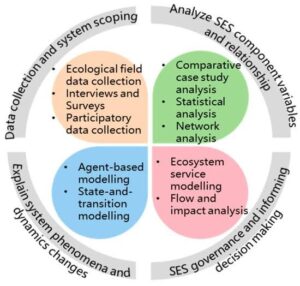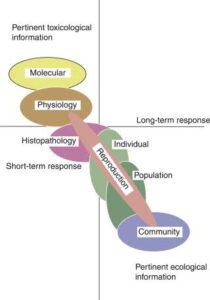Back to: Botany 300 Level
Hello, my brilliant Afrilearn scholar! I hope you’re having a great day! Have you ever wondered how scientists figure out why some plants grow well in certain areas while others struggle? Or how they predict the effects of deforestation or climate change on plant life? Well, they don’t just guess—they follow organised steps called ecological research approaches to find answers! Today, we’ll break it down in a way that is easy, fun, and relatable.
Approaches to ecological research
Imagine you are a detective trying to solve a mystery. Let’s say you notice that mango trees in your area are producing fewer fruits than usual. You wouldn’t just assume the cause, right? Instead, you would observe, ask questions, collect clues, and test different ideas until you find the answer. That’s exactly how ecological research works!

There are three main approaches to ecological research:
1. Observational Approach (Watching and Recording Nature)
This is like being a plant detective! Scientists carefully observe plants in their natural habitat without interfering. They record details like how much rain falls in an area, how plants grow over time, and what animals interact with them. For example, a researcher might spend months in a rainforest watching how insects help pollinate flowers.
2. Experimental Approach (Testing Ideas in Controlled Conditions)
Sometimes, just watching isn’t enough. Scientists create experiments to test how certain factors affect plants. For example, if a scientist wants to know how drought affects maize, they may plant two groups—one with regular watering and another with very little water. By comparing the results, they can see how lack of water affects maize growth.

3. Modelling Approach (Using Mathematics and Computers to Predict Changes)
Nature is complex, and sometimes, scientists need help predicting future changes. They use mathematical models and computer simulations to study things like climate change, deforestation, and plant population growth. For example, researchers can predict how cutting down trees in northern Nigeria could lead to more desertification in the future.
Summary
Ecologists use different approaches to study how plants interact with their environment. The observational approach involves watching and recording plant life, the experimental approach tests ideas in controlled conditions, and the modelling approach uses maths and computers to predict ecological changes. These methods help us understand nature better and find solutions to environmental problems.
Evaluation
- What is the observational approach in ecological research?
- How does the experimental approach help scientists understand plant growth?
- Give an example of how the modelling approach can be used in ecological research.
- Why is ecological research important?
You are doing great! Keep asking questions and exploring the wonders of nature. Who knows? You might become a great ecologist one day, solving big environmental problems! Keep learning with Afrilearn, and see you in the next lesson!
